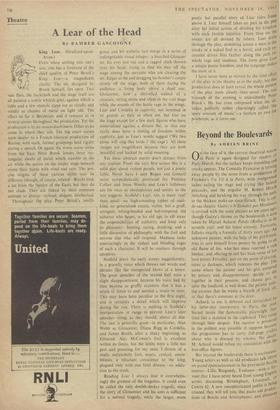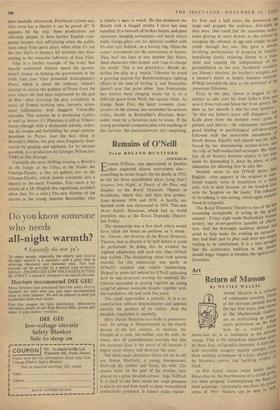Beyond the Boulevards
By ADRIAN BRINE
ON the face of it, the current theatrical season in Paris is again designed for readers of Paris-Match; but the surface keeps trembling and cracks appear. The Comedic Francaise is turning away people by the score from a production of Feydeau's fin Fil a la Palle, with overgowned ladies sailing the stage and crying like hunted peacocks, and the popular M. Robert Hirsch twitching and hawking his way through the Part' in the thickest make-up since Grock. This is col- de-sac theatre. Guitry's .VEcoutez pas Mestlaines is revived with the same players as ten years ag°, though Guitry's throne on the boulevards is now taken by Marcel Achard. Palate (Rollo) is in ItS seventh y,,ear, and his latest comedy. Thr1ll/04 follows exactly a formula of thirty years ago- A" unknown painter, with the help of his girl-friend, tries to save himself from penury by going t°,an old flame of his, who has since married a rich banker, and offering to sell her back some of .her love letters. Frivolity, just on the point of cloYolgi turns to darkness, which redeems the play. The, scene where the painter and his girl, cornere.0 by penury and disappointment, decide to die together in their pension, and choose gas spite the landlord, is well done, the painter Mat.'" mg excuses that he wants a breath of fresh air' or that there's someone at the door. Achard, to me, is debased and diminished bY his latter-day interpreters in Park. the Pr'el buried inside the fashionable playwright theY treat like a skeleton in the cupboard. They roil through their despair. The squalor is Presenle in the politest way possible (I suppose becaltse the programme has to carry full-page credits about who is dressed by whom). No dinibt M. Achard would refute my contention with the box-office figures. But beyond the boulevards there is excite; Young actors as well as old producers talk ilh'an on grand epanouissement in the provincial theatre centres—Lille, Burgundy. Toulouse—with a r.c5.rti your that I have never heard from young Eng11, actors discussing Birmingham, Liverpool. .erng Centre 42. A new unsophisticated public is b created, they will tell you, that packs out producs tions of Brecht and Aristophanes. and diseusse
them heatedly afterwards. Provincial citizens say, 'Our town has a theatre it can be proud of!' It appears, by the way, these productions are vibrantly played. (I have known English com- panies become very self-pitying when the public stays away from great plays, when often it's not the text that's to blame.) All attribute this blos- soming to the muscular influence of Jean Vilar.
Vilar is a further example of the irony that heavily subsidised theatres spend the govern- ment's money on kicking the government in the teeth. Last year Vilar presented Aristophanes's Peace, which is about the ordinary citizen's attempt to rescue the goddess of Peace from the cave where she had been imprisoned by the god of War—after rewriting the play completely in terms of French working men, harvests, arma- ment millionaires, with doggerel Villon-like choruses. This autumn he is producing Galileo as well as Arturo IA Planchon is still at Villeur- banne (though with a decimated subsidy, reduc- ing his troupe and forbidding his usual summer incursion to Paris.) And the best thing at Barrault's Odeon, the play most frequently inter- rupted by gasping and applause, for its obvious parallels, is a production by Georges Wilson (ex- TNP) of The Hostage.
Currently the most thrilling evening is Brecht's In the Jungle of the Cities, at the Studio des Charrips-Elysees, a tiny art gallery, not on the Champs-Elysées. which Jouvet converted into a theatre in the early Twenties. You reach it by means of a lift (English fire regulations wouldn't allow that, for a start.) The new director of the theatre is the young Antoine Bourseiller, who is clearly a Nan to watch. He has produced the Brecht with a fanged cruelty I have not seen equalled. In a network of broken beams, and open staircases, hanging newspapers and harsh stucco walls, Garga plays out his spiritual conflict with his alter ego, Schlink, on a boxing ring. Often the actors' movements are the movements of boxers. They hurl the lines at one another like blows, these characters who despair and 'rage to change the world.' This is not gimmickry—Brecht de- scribes the play as a 'match.' Likewise he noted a growing passion for Rembrandtesque lighting effects at the time of writing it, and Bourseiller doesn't miss that point either. Jean Podromides has written hard clanging music for it, in a different genre from Weill, but equally bitter. As Garga, Sarni Frey, the latest romantic jeune pr(mier of the cinema, has astonished his severest critics, thanks to Bourseiller's direction. Bour- seiller must be a ferocious man to know. If the young provincial companies play with anything of this fervour, the epanouissement isn't surprising.







































 Previous page
Previous page